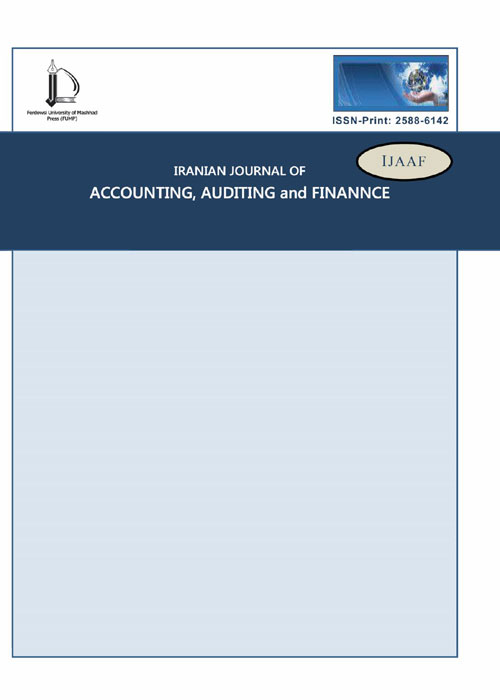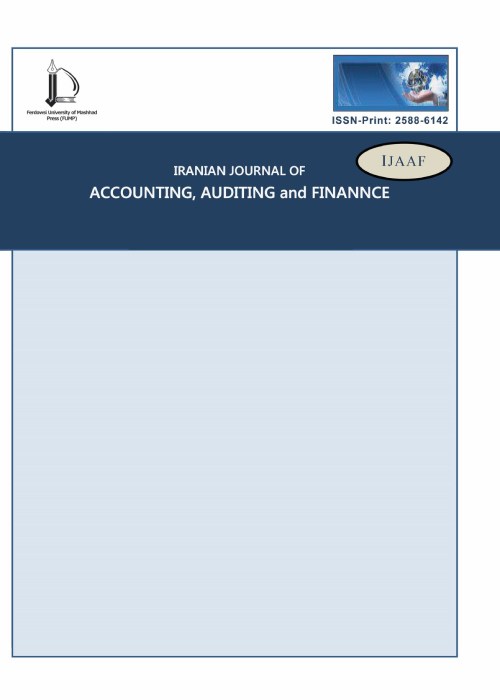فهرست مطالب

Iranian Journal of Accounting, Auditing and Finance
Volume:6 Issue: 1, Winter 2022
- تاریخ انتشار: 1400/12/25
- تعداد عناوین: 7
-
-
Pages 1-13
The purpose of this research is to examine the impact of strategic corporate social responsibility on work meaningfulness and tax avoidance through ethical leadership. Standard questionnaires based on Turker (2009) Dehugh and Danhartug (2008), and Arnux et al. (2017) with 84 items were used to measure the variables. Content validity of the questionnaires was confirmed by a team of experts and the reliability of the four questionnaires was supported by Cronbach's alpha, which was equal to 0/902. The statistical population consisted of 90 finance directors at the headquarters of firms accepted in the Tehran Stock Exchange in 2021. Totally, 73 completed questionnaires were returned and data analyses were done using structural equations modeling. The results showed that CSR had a significant effect on tax avoidance. In addition, the meaningfulness of work had a significant effect on the inverse relationship of social responsibility and tax avoidance. Moreover, ethical leadership improved this relationship. According to the results of the previous studies and the applied study results, the researcher would like to submit a proposal to the directors and heads of the boards of directors of the Tehran Stock Exchange companies under study. This study adds to the CSR literature and integrates it with tax avoidance by signifying the role of job meaningfulness and ethical leadership in the CSR process. By presenting a refined analysis of CSR in a developing country, this research expands the understanding of the expression of CSR and the effects that on Iranian companies.
Keywords: strategic corporate social responsibility, Ethical Leadership, meaningful work, Tax avoidance -
Pages 15-24
The stock exchange is one of the most powerful sectors, which contribute significantly to the economy's wealth. It plays a crucial role in economic growth and economic development, to which industry, trade and trade as a whole would be benefiting. Therefore, a significant number of research projects have been devoted not surprisingly to understanding the nature of stock market movements and their general performance. A number of studies have shown that macroeconomic variables have a significant impact on stock market performance, while other studies have at best found an inconclusive relationship. It is also worth noting that most of these studies were conducted on developed markets and rarely touched on the combination of emerging and developed markets. Hence this study aims at understanding the impact of selected macroeconomic variables such as Export growth, Import growth, Trade balance, Inflation rate, Broad money growth and exchange rate on the stock market chosen Indices of five Asian countries such as India, Japan, China, Hong Kong and Singapore. The Augmented Dickey-Fuller test (ADF), Granger causality test, Johansen cointegration test the short-run and long-run cointegration between the variables. Variance decomposition analysis is also used to determine how much of the variability in stock returns is lagged by its own variance. The study's findings reveal a substantial long-run cointegration among the macroeconomic variables and stock indices in the case of Japan, China, Hong Kong, and Singapore. All the macroeconomic variables are integrated into I (1) except for the trade balance in the case of Japan, which is integrated into I (2).
Keywords: Macro-economic variables, Augmented Dickey-Fuller test (ADF), Granger causality test, Johansen cointegration test -
Pages 25-33
The bankruptcy of international firms is due to accounting fraud ignorance that finally arises from the decline of morality and forgetting the auditing mission as a self-governing profession. The basis of most auditing performances should be assessed in the behaviours and values of auditors, so professional behaviour and its consequences are among the main research topics in organisational areas. This paper aims to explain the priorities of professional ethics in auditing using the Fuzzy Delphi Approach. In this paper, the Fuzzy Delphi Technique is applied as one of the scientific analysis techniques to reach a consensus among panel members (scholars) for determining the dimensions and indicators of professional behaviour code. To collect the research data, a 25-item questionnaire is designed using the previous studies' results. An interview is sent for the panel members, including scholars and specialists with PhD in accounting and 5 years of work experience with research records. The obtained results are analysed using the Fuzzy Delphi Technique. Five aspects and their subsequent indicators are detected under environmental, organisational, social, ethical values, and personality trait components. These subsections can direct the managers and planners to develop professional ethics.
Keywords: professional code of ethics, Ethical values, Professional ethics -
Pages 35-51This study aimed to examine the financial health of the corporate governance-bank efficiency relationship. The statistical population encompasses all commercial, non-commercial, and specialised banks during 2011-2019. Since its statistical value is low, the sample size equals the statistical population. According to previous studies and various sources, the efficiency of banks was calculated using a nonparametric data envelopment analysis (DEA) method. Corporate governance was computed using the associated dummy variables. The index of financial health determinants was also estimated using the CAMELS system and ranked by Technique For Order Preference By Similarity To Ideal Solution (TOPSIS) method. Findings showed that corporate governance has a significant effect on the efficiency of banks and the financial health of banks. In addition, financial health has a significant effect on the efficiency of banks. Since the study's first hypothesis was not rejected, financial health with an incomplete mediating role significantly affected the relationship between corporate governance and bank efficiency.Keywords: Bank efficiency, Financial health, corporate governance, Data Envelopment Analysis, Banking
-
Pages 53-66As the impact of culture, especially money belief, is greater than the rational analysis of the capital market in developing countries, the expansion of Iran’s capital market has led to an increased investment addiction. Since a few studies have been conducted in this area so far, this study investigates the impact of money beliefs on investment addiction. Thus, 415 questionnaires were distributed among investors, of which 346 were accepted. The data were analyzed using structural equations in AMOS software using the maximum likelihood estimation (MLE) method. The findings suggest that money worship and money status beliefs significantly affect investment addiction, whereas money avoidance belief does not affect investment addiction. In addition, the money vigilance belief has a significant negative impact on investment addiction. Given the effects of most money beliefs on investment addiction, policymakers and consultants of the capital market can readily safeguard traders from capital market dilemmas through effective money belief-building training.Keywords: Money avoidance, Money worship, Money status, Money vigilance, Investment addiction
-
Pages 67-75One of the main and most important sources of information for decision makers, especially external users, is the reports and financial statements of companies. Therefore, the purpose of this study is to determine the personality traits affecting the financial reporting of managers and companies listed on the Tehran Stock Exchange.For this purpose, a sample consisting of companies listed on the Tehran Stock Exchange in the period from 2014 to the end of 2018 was selected. After studying the theoretical foundations of research topics and formulate research hypotheses, collect and prepare data sets used by researchers and eventually hypotheses using structural equation modeling approach tested and analyzed.The results show that personality traits have a significant effect on the financial reporting of managers and companies listed on the Tehran Stock Exchange. thus Investors as well as the board of directors of companies are advised to consider the personality traits and components of financial intelligence of the person or persons in question at an acceptable level in selecting financial managers.Keywords: Personality types, Financial reporting quality, Financial managers
-
Pages 77-90Capital market anomalies are caused by factors haven’t been considered in capital asset pricing models. The theories of extreme value are one of the arguments for explaining anomalies. On the basis of theory of extreme value, the tail risk is an adverse event that can have a negative impact on stock excess returns. Therefore, this study aimed at investigate the effect of combining the anomalies of size, value and idiosyncratic risk with tail on stock excess returns. In this study, we have used two criteria of Aggregate Tail Risk and Hybrid Tail Covariance Risk to measure the tail risk. For this purpose, using the systematic removal method, a sample of 136 firms listed on the Tehran Stock Exchange in the period from 2008 to 2019 was selected. The research hypotheses were tested using the Five-Factor Fama and French model (2015). The results suggested that the combination of size and tail risk portfolio and the combination of value and tail risk portfolio have a negative effect on excess return on risk. The results also showed that the combination of idiosyncratic risk and tail risk portfolio has a positive and significant effect on stock excess returns. Therefore, by combining these portfolios, investors can gain excess returns in the Iranian capital market. The results generally indicated that tail risk can be added to asset pricing models in addition to the variables of the five-factor Fama and French model.Keywords: Size Anomaly, Value Anomaly, Idiosyncratic Risk Anomaly, Tail Risk, Stock Excess Returns


